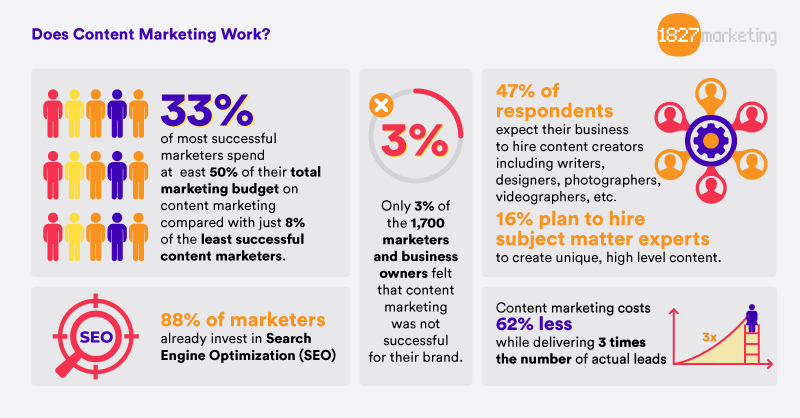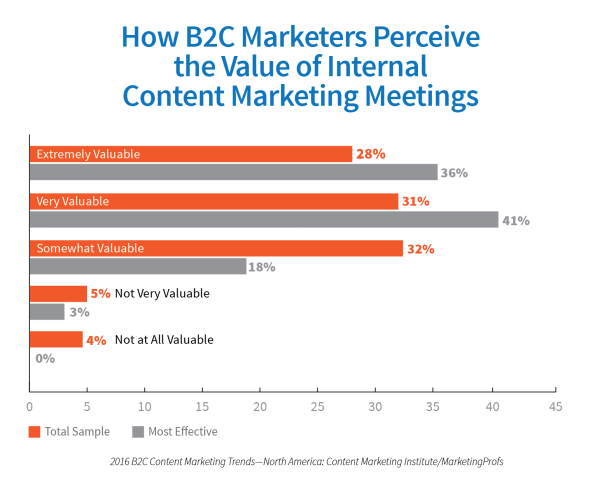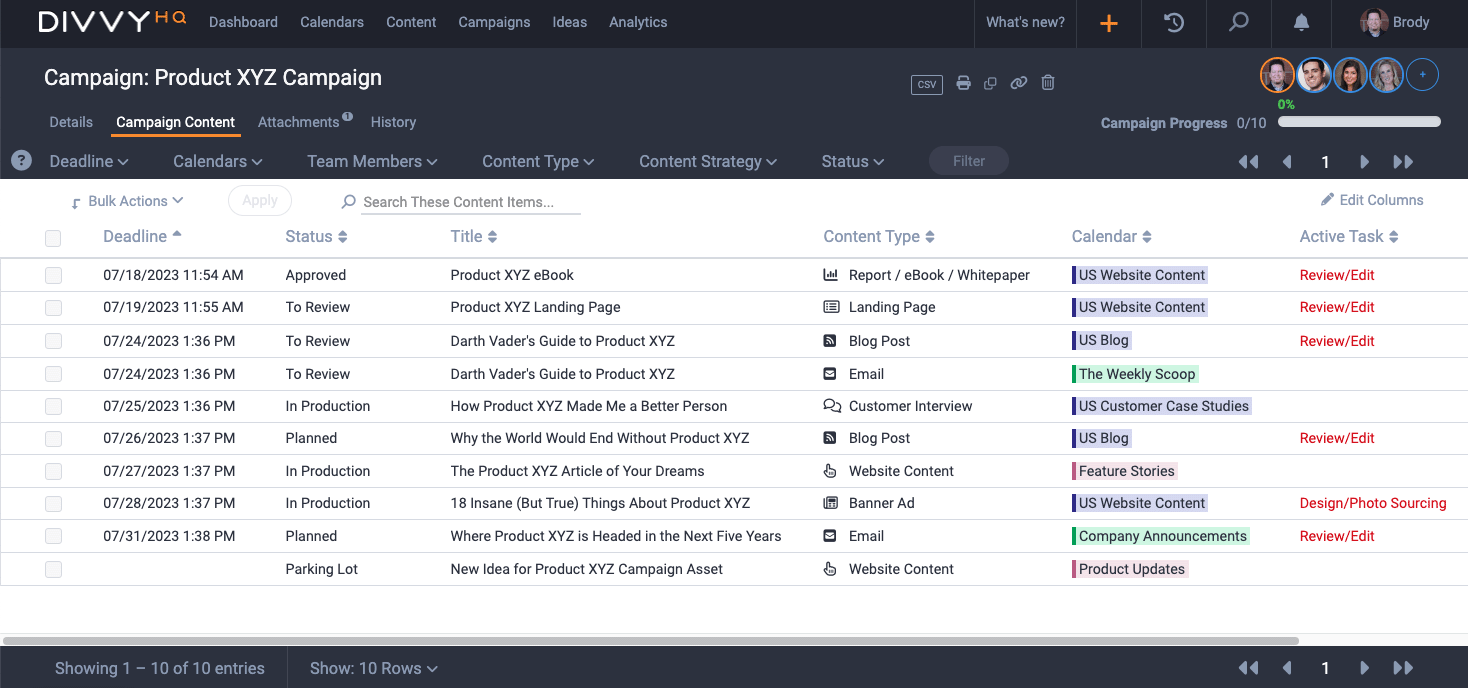Content marketing might be 62% less expensive and lead to around three times the number of leads as outbound marketing, but your return on investment for a content campaign won’t be so great without effective execution. How many hours does your team devote to campaign planning meetings?
Do those extra hours spent in meetings translate to mind-blowing results? If so, go ahead and click away from this page.
On the other hand, if your team struggles to turn a productive (if you’re lucky) meeting into a well-executed campaign, you’re in good company. Let’s look at why your sessions aren’t helping you turn planning into action and what you can do to fix that.
Source: 1827 Marketing
Getting Over the Trouble With Unproductive Meetings
Let’s face it: Meetings are a hassle in person or over Zoom. In theory, virtual meetings make it easier to find a time when most of your team can attend. However, successfully scheduling a meeting does not equal successfully running one.
An estimated 70% of workplace meetings prevent employees from completing other tasks. If you’re taking your team away from other content production tasks to plan a content campaign, ensure the meeting isn’t a time waster.
Wasting time can be a real problem, with nearly half of employees believing meetings are generally unproductive. Several factors can lead to a lack of productivity, including:
- Poor meeting planning and preparation
- No clear agenda or goals for the meeting
- Too many meetings that drain your team’s energy and thinking capacity
- Conversations veering way off-topic
- Poor time management
- Inability to make solid decisions
The first step to turning a campaign planning meeting into a launchpad for a highly successful campaign is to ensure your meetings are productive.
Increasing Meeting Productivity
While most of us would probably agree that we have too many meetings, we likely can’t eliminate them altogether.
To start, though, ditch any unnecessary gatherings. If the topic is truly suitable for email, don’t make the team get together for a “quick meeting.”
If you must meet — and content campaign planning generally requires it — take steps to ensure productivity:
- Define meeting goals.
- Establish an agenda that will help you meet those goals, but keep it short (it’s often better to break up one long meeting into two to maintain focus and productivity).
- Distribute the agenda before the meeting and assign preparation tasks if needed.
- Invite only the necessary team members, but invite everyone who should attend.
- Ensure you have all the tools, technology, and data you need to run the meeting and accomplish your goals.
- Set a time limit for each agenda item — and stick to it.
Fixing your meeting structure is great, but it isn’t the end of this story.
Source: Content Marketing Institute
Creating an Effective Content Campaign Plan
Your campaign plan sets the stage for execution. If your planning meeting doesn’t result in a fleshed-out plan, your campaign delivery will likely not meet your expectations.
Your plan should include measurable goals, content channels and types, and key performance indicators you’ll use to determine whether content performance meets campaign goals. You should also establish campaign checkups to track progress and make any necessary adjustments during its run.
Divvy’s analytics tools pull data from all campaign channels and generate comprehensive, understandable reports. Evaluating progress based on data has never been easier.
You’ll want to assign action items — or content and campaign tasks — and set deadlines during your meeting. Create a campaign brief and distribute it to your team.
Ideally, post it where everyone has access and can comment on the plan itself. When integrated with Divvy’s platform, a team communication tool such as Slack works well for this, allowing your team to communicate seamlessly between campaign plan and individual content conversations.
The Move From Planning to Execution
Your planning meetings should set you up for success, but what happens after your team leaves the room determines the actual outcomes. How many meetings have you had that seem productive and result in specific action items, but execution falls flat on its face?
You need a management system, campaign workflow, and visibility to ensure the entire team is accountable for their roles and tasks.
DivvyHQ Screenshot – Campaign Content
Using a Campaign Management System
Using the right system to manage your campaign allows you to organize and execute tasks in one place. You need more than a project management system that lacks content production tools.
Divvy’s content operations platform contains both project management and content production tools. It’s an all-in-one system that can handle campaign actions from planning through execution.
Our dynamic content calendar allows you to establish a campaign and assign each content piece to the campaign, making it easy to schedule content at the clip you determine in your plan. Anyone with access can filter the calendar to view only the campaign schedule. They can also see what’s up for the day or what’s coming down the pike in the next week or month, or for the campaign’s duration.
Creating a Campaign Workflow
You need a custom workflow for your campaign, outlining tasks for each content piece, task order, and responsible team members. Your workflow should also establish deadlines for each job.
Divvy’s platform allows you to implement your campaign workflow within the system. If you create workflows for each campaign type, our system automates task generation, assignments, and due dates immediately upon creation of a campaign of each type.
Establishing Visibility
It does no good to assign tasks and deadlines if team members can’t keep track of them. To overcome this, visibility is inherent in our system.
When you schedule content and implement a workflow, tasks and deadlines are visible to everyone with access to the calendar. Every team member knows their responsibilities and when their assigned tasks are due.
They also know where each content piece is along the content production process and who should be doing what on any given day. As team members mark tasks as completed, the system notifies team members so the next person in the production process can begin their duties.
The Only Content Operations Platform You Need
Running a content campaign is hard enough without attempting to organize your team and campaign tasks using several tools from disconnected systems. Divvy’s platform eliminates that chaos, allowing you to streamline your campaign processes to ensure planning meetings are productive and translate to a smooth execution. Request a demo to see how we can help you sleep better at night, even in the middle of a campaign push.



